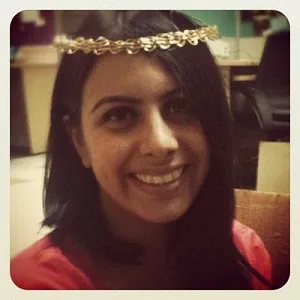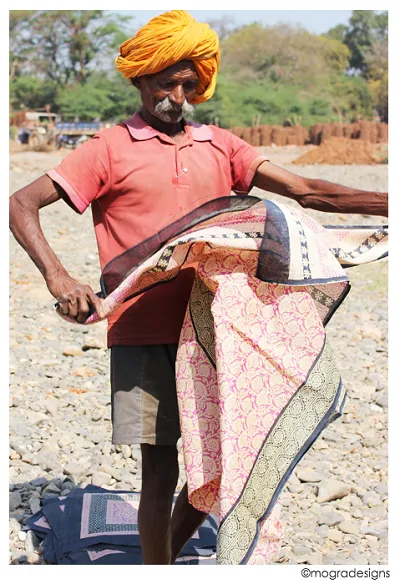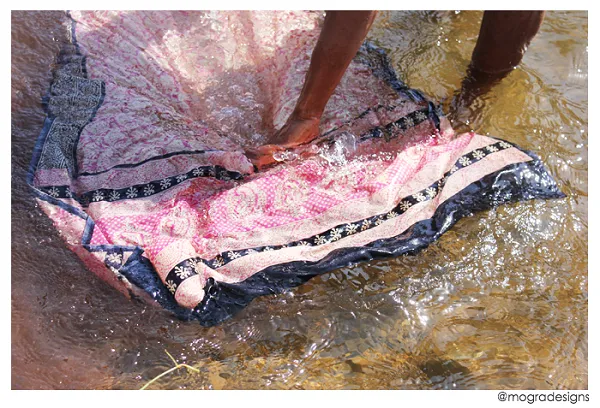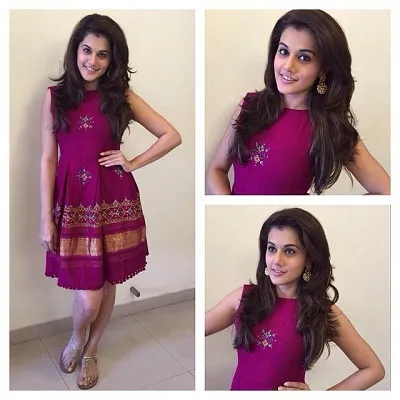Fairtrade fashion startup Mogra believes in growth done right
Fashion in India exists in two stark parallels. On one hand you have the western imitative season cycle, bright pop art mass produced e-commerce merchandise and the luxury brands catering to an elite handful. The other more subtle branch survives on handloom, heritage weaves and designs, indigenous crafts and painstakingly created handmade products. A new generation of handloom entrepreneurs, spurred by the nostalgic yearnings of their grandmother’s Godrejes or simply trying to reconnect to roots that the digital age has disconnected them from, are working to ensure that this industry survives the challenges of obscurity, extinction and indifference.

Sheena Roy was all set to join the mainstream fashion industry. The ‘rebel in a leather jacket’ got her bachelor’s degree at NIFT, Delhi and worked with avant garde designer Prashant Verma before moving to New York for a season to intern with celebrity designer Asher Levine, creating costumes for musicians including Lady Gaga, The Black Eyed Peas, Jim Steinman and Bruno Mars among others. On returning to India, she worked at Fashionandyou.com before leading the creative team at Indianroots.com.
The idea
“The shift from New York to New Delhi gave me a fresh perspective on how we view design in India. Where ethnic influences from the East are prominent in Western couture designs and street style, they lack character and stories in our own country.
Although there are multiple talented designers crafting gorgeous Indian wear using traditional textiles, there are very few labels that use locally sourced, handcrafted or traditional fabrics and techniques for western wear. As someone who isn’t instinctively drawn to ethnic wear for my daily style choices, I was baffled at the short supply,” says Sheena. “This newfound appreciation for Indian crafts and a vision to create one of a kind pieces with a strong cultural influence led to the birth of my startup Mogra in June 2014.”
Being part of a family that was constantly travelling, Sheena’s childhood was a litany of schools, friendships, relationships and cities. She traces her creative outlook to her unusual upbringing. “We spent a significant amount of time in a culture soaked Kolkata and a progressing New Delhi/NCR; the combination of these two juxtaposed worlds gave me a mixed outlook on fashion and trends.
I also went to an all-girls school, where trends were defined by the length of your socks and skirts and not told to us through the pages of fashion magazines. Unknowingly, this taught me that one doesn’t need to follow fads to be “cool” and that you can be creative even with a limited wardrobe,” she exclaims.
She named her startup after the Mogra flower (Jasmine) because it is her favourite scent and because, “It instantly makes me nostalgic.”
Passion, travel, crafts and style
Sheena is clear to assert the differences that sets Mogra apart from the general fashion milieu. “Unlike other fashion labels and brands, we don’t work solely in seasonal cycles but create new products on an almost daily basis. To be able to do this, we are constantly researching, shopping, traveling and developing.
Although most of our research takes place online, most of our sourcing is done by traveling directly to craft clusters to handpick fabrics. These fabrics are always consistent with traditional designs that they have been used for decades, and sometime centuries. Once sourced, these fabrics take on a fresh avatar in our contemporary designs.
Fabrics that aren’t sourced from craft clusters are always locally sourced.”
Balancing fair trade and profit

Unlike the mainstream fashion industry which is notorious for the levels of exploitation rampant through all its layers, Mogra is founded on the principles of fair trade. “Fair trade is essentially a partnership between producer and buyer where the producer is paid fair prices that contribute to the sustainability of their craft. In our case, when our craftsmen get a better deal and don’t have to compromise on prices just to make ends meet, they are not only able keep up production but also employ locals to train, which, in turn keeps the craft alive.
When I started Mogra with a vision to push Indian crafts into western design, fair trade was an automatic off-shoot. Since I only source handmade, handcrafted, traditional or local textiles, I had to pay a fair price so that I could keep sourcing them.
Today, people are very careful about their lifestyles and prefer homegrown, locally sourced, handmade and handcrafted ingredients in their wardrobes as much as their food choices. This means that they are willing to pay a little extra for something that goes a long way,” she says. And she is confident that this evolving mind-set will lead the way for Mogra’s growth as well. “With consumers becoming more aware of their social, cultural and ecological footprints, the industry too is evolving to meet their requirements. Designers and brands, both big and small, in the East and West, are shifting to naturally made and responsibly sourced materials for their creations.
There are now many young labels like The Meraki Project, White Champa, Jodi etc, pushing the boundaries and consciously opting to use handcrafted fabrics over mass produced store bought fabrics,” she muses.

Sheena admits that a startup like Mogra, especially in its small scale, is only able to survive because people are now willing to experiment with their wardrobes. She explains, “This wasn’t the case when we first started with more conservative styles. Today, when we craft dresses from sarees and shawls, customers welcome them with open minds. The challenges and excitements today as opposed to when we first started include digging deeper to uncover lesser known crafts while still making our niche garments accessible to a wider audience.”
No to e-commerce
Operating out of Etsy and Facebook, Sheena is keeping her products out of the e-commerce bandwagon, strangely, because she was part of that herself not long ago. “Having worked in the e-commerce industry for multiple years, I know the ins and outs of their sales and sourcing procedures. While it works wonders for many brands, my products need to be sold not only because of how they look, but also through the stories they tell. Unfortunately with each online store competing with its neighbour, the vision gets lost in translation.”

For Sheena, the reason to immerse herself in the world of age old Indian arts and crafts was simple. “While the beauty and intricacy of Indian crafts is no secret, the stories behind them are not always evident. It’s these stories of hand-me-down skills and heirloom traditions that fascinate me. Like knowing that Bagh Prints aren’t originally from Bagh or experiencing the beauty of Kutch mirror embroideries done on age old garments that were once part of a trousseau,” she says.
It is this attitude which fuels her vision for the future of Mogra. “Our plan is to unearth crafts that have either lost their significance in the modern world or techniques that are mostly unheard of, especially in the West, and reinvent them to make them both wearable and affordable. By changing people’s perception of traditional crafts and garments, we see Indian fabrics becoming more acceptable as the norm, rather than kept away for pure occasion wear or costumes,” she says hopefully.

It’s not that there is dearth of competition in the Indian market, but Sheena is firm that no one comes close to what Mogra is offering consumers. Sheena iterates, “While there are a handful of startups and young designers working with similar fabrics and promoting Indian crafts, our designs tend to steer more towards breaking the norm and creating contemporary looks that contrast these traditional textiles. Our modern silhouettes is what sets us apart since we cater to a global market that wants to incorporate Indian crafts in their daily wardrobe without wearing a sari or salwar suit.”
The best and the worst
Sheena started Mogra with a personal investment of 1 lakh. Since then the brand has sustained and grown with no external funding. The market’s reaction too has been reassuring. “I am absolutely overwhelmed by the market’s response to our work; both by customers and the media. Recently we’ve been featured in the first edition of Miss Vogue India and in the Pune Mirror featuring looks from our SS15 collection. In addition to these two large publications, we’re blessed to be written about on some of our favorite popular websites including Homegrown, The India Tube and LBBD,” she says.
Sheena states that one of the more challenging parts of starting Mogra was the decision to give up a stable 9 to 5 job and dive headfirst into the business. But the sting of sacrifices hurt less when you have a supportive family and friends believing in you, she says. “And of course, the biggest experience has been setting up Mogra in an absolutely new town with no knowledge of the city or its people. Coming from fast-paced Delhi to laidback Pune was very frustrating and difficult at first, but the culture, traditions and people have given us an edge we would not have had in a big city.”
The best part about starting up has been the learning curve. “The best part about starting up has been seeing our products travel the world. From India, Thailand, Sri Lanka and Korea to USA, UK, France, Italy, Greece, Australia and Brazil, our customers have made Mogra a truly global brand.
Other than this and the success of the label, I am always appreciative of the fact that because I chose to single handedly steer the business, I am now an accountant, a photographer, a PR and marketing guru and a craft connoisseur among other things!”
Advice
Sheena has some solid advice to offer to those struggling between pragmatism and idealism. “Do it if you truly believe in your idea or product! Like everything in life, it won’t be easy but the struggle is worth it when someone appreciates your work. Don’t be quick to expand or grow if you can’t afford to and always remember to be aware of your business’ ecological footprint and social responsibility.”







